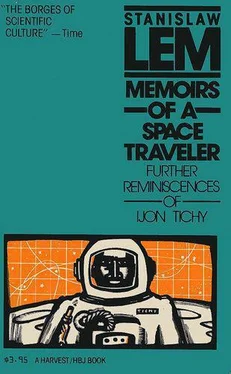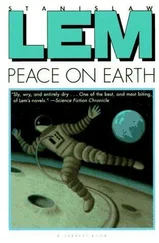“You are Zazul, Professor Zazul, aren’t you?” I asked.
“How do you know me?” he growled.
I made some trite remark to the effect that it was hard not to know such an outstanding scientist.
He received this with a scornful sneer on his froglike lips.
“A storm?” he said, for I had mentioned it. “I hear it. So? Go somewhere else.”
I said that I understood perfectly and had no intention of disturbing him. A chair or a stool in the hall would do; I would wait out the worst of the storm and be on my way.
The rain had really started coming down in buckets. Standing in the high hall as if at the bottom of a huge shell, I heard it pelt the house on all sides. It made an alarming racket.
“A chair?” he said. I might have asked for a golden throne. “A chair, really! I have no chair for you, Mr. Tichy. No chair to spare. I think, yes, I think it would be best for both of us if you left.”
Looking over my shoulder into the garden — the door was still open — I saw that the trees, bushes, everything had merged into one mass that shook violently in the wind and the streams of water. My eyes returned to the hunchback. I had encountered rudeness in my life, but never anything like this. I began to lose my temper. Dispensing with the social amenities, I said:
“I’ll leave if you can throw me out. But I warn you, I am no weakling.”
“What?” he screeched. “The gall! How dare you, in my own house!”
“You have provoked me,” I replied icily. And added, in my anger and because of his grating voice, “There are some kinds of behavior, Zazul, for which a man can be thrashed even in his own house!”
“Scoundrel!” he shrieked, even louder.
I seized his arm, which felt as though it had been whittled from a rotten branch, and hissed: “I will not tolerate abuse. Understand? One more insult and you will remember me as long as you live!”
For a second or two it seemed that we really would come to blows, and I felt shame — how could I raise my hand against a hunchback? Then the unexpected happened. The professor stepped back, freed his arm from my grip, and, with his head twisted even lower, accentuating the hump, began to giggle in a revolting, high-pitched voice. As if I had regaled him with a rare joke.
“Well, well,” he said, taking off his pince-nez. “You are a tough one, Tichy.”
With the tip of a long, nicotine-stained finger he wiped a tear from his eye.
“Good,” he rasped. “I like that. Can’t stand manners, mealy-mouthed talk, but you said what you thought. I hate you, you hate me, fine, we’re even, everything’s clear. You can follow me. Yes, Tichy, you surprised me…”
And, chattering in this vein, he took me up a creaky wooden staircase dark with age. It went up around a huge square hall, paneled with bare wood. I remained silent, and when we reached the second floor Zazul said:
“Tichy, I can’t afford parlors and guest rooms; you can see that. I sleep among my specimens, yes, eat, live with them. Come in, and don’t talk too much.”
The room he ushered me into was the one whose three windows were shaded with sheets of paper, paper once white but now extremely dirty, spotted with grease and innumerable crushed flies. The windowsills were black with dead flies. When I closed the door, I noticed comma-shaped marks and dried, bloody insect fragments on it, as though Zazul had been under siege here by all the Hymenoptera. Before I had time to wonder at this, I noticed the other peculiarities of the room. In the middle stood a table, actually two sawhorses with ordinary, roughly planed boards between them; books, papers, and yellowed bones were piled there. But the strangest thing about the room was the walls. Large, crudely constructed shelves held rows of thick bottles and jars; opposite the window, in the space where the shelves broke off, was an enormous glass tank resembling an aquarium the size of a cabinet — resembling, rather, a transparent sarcophagus. The upper half of the tank was covered by a carelessly thrown dirty rag whose tattered ends hung halfway down the glass. But what I saw in the lower, uncovered half made me freeze.
All the jars and bottles contained a blue, cloudy liquid, as in an anatomical museum where various organs are preserved in embalming fluid. The tank was the same type of container, only of enormous size. In its murky depths, which glimmered with a bluish light, two shadows a few centimeters above the bottom rocked back and forth extremely slowly, with the motion of an infinitely patient pendulum. To my horror I recognized these shadows as human legs in alcohol-soaked trousers.
I stood petrified. Zazul did not move, did not make a sound. When my eyes went to his face, I saw that he was very pleased. My outrage, my revulsion delighted him. He held his hands clasped on his chest, as if in prayer, and chuckled with satisfaction.
“What’s the meaning of this, Zazul?” I said in a choking voice. “What is it?”
He turned his back to me, and his hump, so horrible and pointed (looking at it, I feared that the jacket stretched over it would tear), swayed in time with his steps. He sat down in a chair that had an open back (that piece of furniture made me shudder) and suddenly said, with apparent indifference, even weariness:
“It’s a long story, Tichy. You wanted to wait out the storm? Then have a seat and don’t disturb me. I see no reason why I should tell you anything.”
“But I do,” I replied. I had regained my composure to some extent. In the silence filled by the patter of the rain I went up to him and said, “If you don’t explain this, Zazul, I shall have to take steps that will cause you considerable trouble.”
I expected an outburst, but he did not turn a hair. He looked at me and sneered.
“Tell me, Tichy, how does this look? There’s a storm, it’s pouring, you pound on my door, barge in without invitation, threaten to beat me up, and then, when out of the goodness of my heart I try to accommodate you, I have the honor of hearing new threats: now you threaten me with jail. I am a scientist, sir, not a bandit. I am not afraid of jail or of you. I am not afraid of anything, Tichy.”
“That’s a human being,” I said, ignoring his sarcasm, for I was certain that he had brought me here on purpose — so that I could make the hideous discovery. I looked over his head at that terrible double shadow, still swaying gently in the blue liquid.
“Yes,” Zazul readily agreed. “As human as can be.”
“This you won’t weasel out of!” I cried.
He observed me; then suddenly something happened to him — he trembled, groaned — and my hair stood on end. The man was laughing.
“Tichy,” he said when he had calmed down a little, but there was still a glint of unholy mischief in his eyes, “what do you say? Let’s make a bet. I will tell you how that" — he pointed — “came about, and when I do, you will not want to touch a hair on my head. Of your own free will, of course. Is it a bet?”
“Did you kill him?”
“In a way, yes. At any rate, I put him there. Unless you think it’s possible to live in a ninety-six-percent solution of denatured alcohol? That there’s still hope?”
His swagger, his self-assured irony in the presence of the body, restored my composure.
“It’s a bet,” I said coldly. “Go on!”
“Now, don’t rush me,” he said, with the tone of a prince granting an audience. “I’m telling you this because it amuses me, Tichy, because it’s a funny story and gives me satisfaction in the telling, not because you threatened me. I’m not afraid of threats, Tichy. But enough of that. Tichy, did you ever hear of Mallengs?”
“Of course.” I was in possession of myself now. There is something of the investigator in me, and I know when to remain calm. “Mallengs published a couple of papers on the denaturation of proteins…”
Читать дальше












